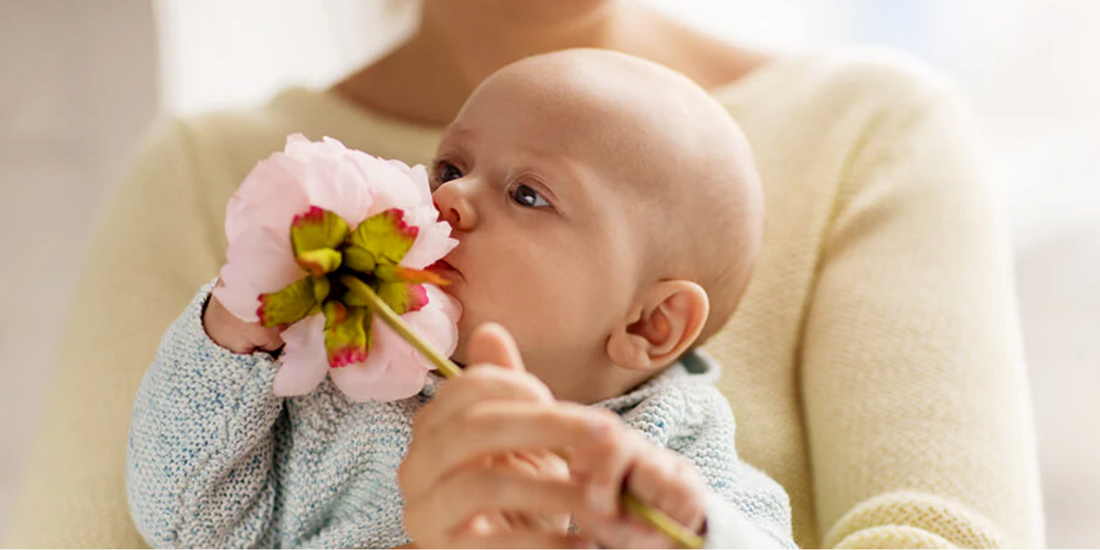
The Truth About Newborns' Sense of Smell: Discovering Their Powerful Olfactory Abilities
Share
When a newborn enters the world, they bring with them a remarkable array of senses, one of the most fascinating being their sense of smell. Often overshadowed by their sight and hearing, the olfactory abilities of infants are both powerful and crucial for their early development, bonding with caregivers, and navigating their new environment.
The Science of Smell in Newborns
- Development of Olfactory Receptors
From the moment they are born, infants possess a fully functional sense of smell. Research indicates that olfactory receptors begin developing while the baby is still in the womb. This early exposure allows newborns to recognize and respond to familiar scents, which can be incredibly comforting in those first few days of life.
- Preference for Familiar Scents
One of the most remarkable aspects of a newborn’s olfactory capabilities is their ability to identify their mother’s scent shortly after birth. This recognition not only promotes bonding but also facilitates breastfeeding, as babies are naturally drawn to the smell of breast milk. This biological connection emphasises the importance of scent in nurturing and attachment.
- Impact of Scent on Feeding
The scent of breast milk plays a pivotal role in guiding newborns towards feeding. Infants are naturally attracted to the smell of their mother’s milk, which helps them latch on and feed effectively. This olfactory cue is vital for their nutritional needs and overall growth.

The Role of Smell in Development
- Emotional Connections
The sense of smell also significantly influences the emotional development of infants. Positive associations with scents can foster feelings of security and comfort. For instance, familiar scents, such as those of their parents, can soothe babies during stressful situations.
- Learning and Memory
Research suggests that olfactory cues can enhance memory in infants. Scents can help them learn about their environment and recognize their caregivers. This connection between smell and memory is an essential part of their cognitive development, laying the foundation for future learning experiences.

Practical Implications
- Creating a Positive Environment
Understanding the olfactory abilities of newborns allows parents to create a positive and nurturing environment. Using familiar scents—like their own fragrance or natural scents—can promote comfort and security. Simple things, such as holding the baby close or wearing soft, unscented fabrics, can help reinforce this bond.
- Safety Considerations
While introducing scents into a baby’s environment, it’s crucial to avoid artificial fragrances that can be overwhelming or even harmful. Opt for natural scents or gentle, baby-safe products to ensure your newborn’s safety and comfort.

Conclusion
The powerful sense of smell in newborns is a fascinating aspect of their early development. By understanding and nurturing this olfactory ability, parents and caregivers can create supportive environments that enhance their babies’ emotional and physical growth. As we discover more about the role of scent in a newborn's life, we can better appreciate the intricacies of their early experiences in this world.
References:
- https://www.ncbi.nlm.nih.gov/books/NBK55972/
- https://www.cloudninecare.com/blog/mothers-your-babies-recognize-your-voice-smell-right-from-birth
- https://www.sanger.ac.uk/news_item/2012-10-04-babies-learn-the-smell-of-mum/
- https://importikaah.com/blogs/news/the-psychology-of-baby-scents-how-newborns-recognize-their-mothers-through-smell?srsltid=AfmBOoqD9_Dojp8QUhF_amzPB9OZSDKJ5pfcAPX7E_nN2pgl7UUjeuex
